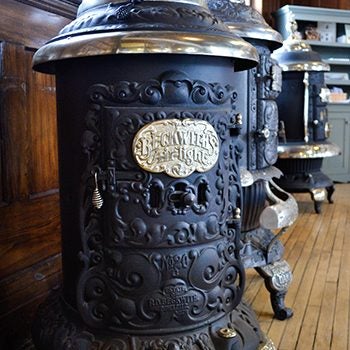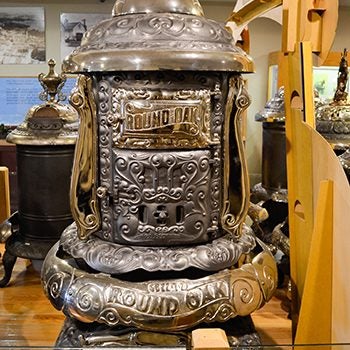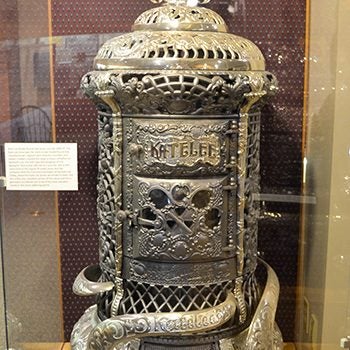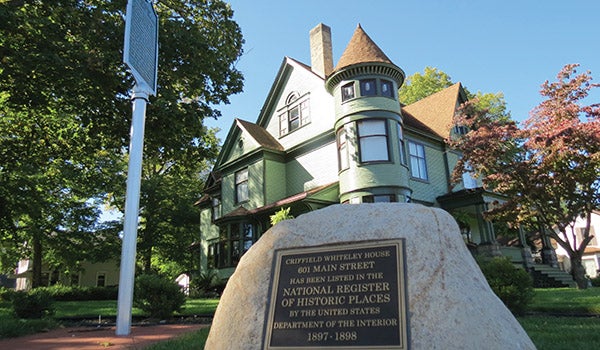Round Oak Stoves a memento of Dowagiac
Published 12:00 pm Friday, March 1, 2019
In conversations about manufacturing in Michigan, a few names and products are likely to come up — Ford, Packard, General Motors, and really anything relating to automobiles from Detroit will likely be mentioned. But from the much smaller Michigan city of Dowagiac came an invention and brand that can still be found around the country.
Round Oak Stove Company, founded by Philo D. Beckwith, may be long out of operation, but its legacy is still strong in Michiana and its heavy iron creations still treasured finds for collectors.
Round Oak started as its own business entity in 1871. Founder P.D. Beckwith was a foundry man and machinist who was as eclectic as his various inventions and famous stoves.
“Beckwith is a great character in southwest Michigan history. He was a great entrepreneur,” said Steve Arseneau, director of the Dowagiac Area History Museum. He was a guy who grew his business, but lived modestly and continued to invest his earnings into the company and Dowagiac.”
Beckwith had been experimenting with various stove designs for personal use in the 1860s, creating his first in 1865, and designing and manufacturing another in 1868 for the Michigan Central Railroad depot in Niles. His stove design was well liked for its efficiency of use, durability and reasonable price. Before long Round Oak was the most sought-after stove on the market.
Beckwith’s stoves started simply. The first designs were simple and practical, not venturing far from the black iron mold. A few models in, however, Round Oak stoves became associated with a sleek, ornate look like that of a luxury car. Domes, doors and racks of nickel plating were added, which continue to make Round Oaks attractive finds for museums and collectors.
The well-priced, fashionable and efficient stoves made their way across the Midwest rapidly, and spread across the country and into Canada as a result. By the 1900s, Round Oak stoves had reached both coasts.
As the Round Oak Stove Company market expanded, so too did the amount of people the company employed. By the 1880s the company employed nearly 200 people, and the company came to employ more than 300 at its height. Round Oak was not only testament to the ingenuity of P.D. Beckwith, but to the scope of the industrial revolution in the 19th Century.
The decline of Round Oak Stove Company, however, was inevitable. The company continued to grow into the 1920s until the Great Depression hit, the first major blow to the company. Round Oak encountered a few brief resurgences during WWII and with the production of newer designs of steel ranges, but the company could not keep up with new technologies and competitors.
Round Oak was sold to the Kaiser-Frazer Corporation in 1947, and its name and assets were eventually sold to Peerless Corporation of Indiana. The last remnants of Round Oak went out in 1967, but the famous ornate wood burners of Beckwith’s original design had long been out of production.
In modern times, Round Oak stoves are collectors’ items and physical memories of a simpler time. The classic designs with the cylinder body, nickel plating and famous Doe-Wah-Jack chief mascot are sought for historical museums, displays and exhibits, as well as collectors with vintage tastes.
The Dowagiac Area History Museum has one of the largest collections of the stoves from its hometown industrial heyday, as well as dozens of pieces of Round Oak memorabilia and artifacts from the company and its statesman founder. Round Oak’s history is the focal point of the museum’s ground floor, where visitors can see the progression of the stoves’ size, style and marketing.
Dowagiac natives still have family roots connected to the stove company. According to Arseneau, Round Oak Stove Company was once large enough to employ one out of every two men in Dowagiac.
“That’s part of the reason the name Round Oak still resonates with people today,” Arseneau said.
Dowagiac may never find itself again at the center of an economic boom or industrial revolution, but it will always have the credit of a sturdy iron stove that kept a growing country warm at the turn of the century, through two world wars and a Great Depression. The automobile industry is a big claim to fame for Michigan, but Michiana’s is Round Oak Stoves.
Photography by Emily Sobecki









